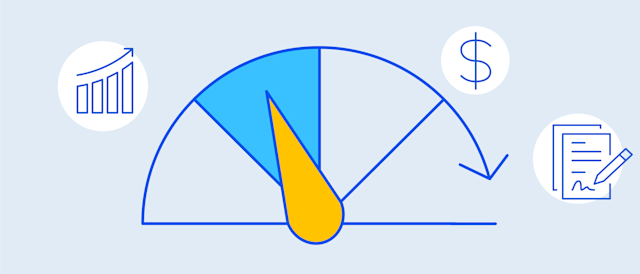What You Should Know About Credit Terms

Summary
Understanding credit terms used in everyday financial transactions can help you make smart financial decisions. Here are 10 terms associated with credit that you should know.
In this article:
Whether you’re applying for a personal loan or reading your credit card statement, you may find some important credit terms a little confusing. In order to best manage your credit, it may help to have a clear understanding of standard industry terminology.
10 Common credit terms to know
Let’s define 10 of the most common credit terms to help you take better charge of your financial health.
1. Billing cycle
The billing cycle for a credit card or loan account refers to the number of days between statements. The length of a billing cycle can vary by credit card or loan provider but typically lasts 28-31 days.1 Once the billing cycle ends, the lender will send you a statement based on all activity during that cycle.
2. Principal balance
The principal balance refers to the original amount you borrow on a loan or credit account, excluding interest and other fees. The portion of a payment that goes toward principal and interest or other fees will be defined in your agreement. In order to pay off a loan in full, the final balance must be $0.00.2
3. Interest rate
The interest rate is a rate that is applied to the principal balance on the loan. Several factors can influence a borrower’s interest rate, including the length of the loan, i.e., its term, the risk of default, and the cost of money for the creditor, which is often influenced by economic conditions such as inflation. The borrower’s credit history has an impact on the interest rate as well.
4. Annual Percentage Rate (APR)
The APR is a percentage that represents the yearly cost of borrowing funds over the term of the loan and includes any fees or additional costs associated with the transaction. The APR varies by bank or lender.
5. Minimum amount due
The minimum amount due is the lowest amount that a borrower can pay each month to keep their account current and avoid late fees. The amount of this payment could be a fixed installment or a percentage of the outstanding balance on the account.
6. Payoff amount
A payoff amount is the total dollar amount that must be paid to close a debt. The payoff amount could be more than the loan principal, because it may include unpaid interest, late charges or a prepayment penalty, depending on your lender.3 The payoff amount can change because the interest accrues daily, meaning the total amount you owe can change up until the day you make the payment.
You can receive your payoff amount by requesting a quote from your lender or credit provider. You may also be able to find the payoff amount disclosed on your online account. Some lenders and credit providers may include a prepayment fee in the payoff amount as well, which should be disclosed when the loan is originated and is found in the loan documents. A prepayment fee is a fee that lenders sometimes include in the event you decide to pay off your loan earlier than the term of the loan.
7. Refinancing
Refinancing is the process of moving one or more debts to a new loan or changing the terms of an existing loan. The reasons for refinancing may vary per borrower, but some include a lower interest rate, lower monthly payment amounts or an extended loan term. However, possible drawbacks can include additional fees that can reduce the overall benefit for the borrower. You should consider the overall cost of refinancing, especially since lengthening the loan term often means you’ll end up paying more in interest over time. Common forms of debt that are refinanced include car loans, student loans and mortgages.
8. Down payment
A down payment is an initial payment in a financial transaction and is traditionally a percentage of the item’s full purchase price. It’s most common to provide a bank or lender with a down payment when buying a car or applying for a mortgage.4 For example, the down payment for a mortgage could equal as little as 3% for a conventional home loan or the standard 20% of the home’s total value depending on your financial situation.5 In addition to improving the odds of getting a loan approved, a significant down payment may lower the monthly payment and reduce the interest rate.6
9. Cosigner
A cosigner is a person in addition to the primary borrower who signs a credit or loan application with the primary borrower. Adding a cosigner to a loan application can potentially strengthen the odds of approval if the cosigner has a more favorable income or credit score than the primary borrower.7 If the application gets approved, the cosigner will be equally responsible for repaying the debt and assume legal liability to pay the debt in full if the primary borrower defaults.8
10. Collateral
Another common credit term is collateral, which is something of value that you own, like a house or car, that is pledged to the lender to secure the repayment of a loan. The type of collateral required depends on the lender and the loan type. However, in order for a loan to be secured, the value of the collateral is usually equal to or exceeds the loan amount.9 If the loan is not paid in full or the borrower defaults, the lender may take possession and sell the collateral to try to recoup their losses.10
The more you know, the more you grow your confidence.
Getting familiar with important credit terms is about more than improving your financial literacy. It’s a smart way to take control of your financial journey. Whether you're buying your first home, managing credit card debt or planning for the future, this kind of knowledge helps you clearly understand the financial decisions you are making— not just today but tomorrow and beyond, so, you can reach goals and enjoy a brighter future.
 Think you're a financial terms expert *and* master puzzle solver? Prove it by completing our crossword puzzle challenge!
Think you're a financial terms expert *and* master puzzle solver? Prove it by completing our crossword puzzle challenge!
Sources:
- What is a Billing Cycle? https://www.experian.com/blogs/ask-experian/what-is-billing-cycle/
- What is Loan Principal? https://www.thebalancemoney.com/loan-principal-what-is-it-5078182
- How Extra Payments Affect Future Personal Loan Payments, https://www.investopedia.com/extra-payments-affect-future-personal-loan-payments-7973996
4, 5, 6. Down Payment: What is it and How Much is Required https://www.investopedia.com/terms/d/down_payment.asp
7, 8. What Credit Score Does a Cosigner Need? https://www.experian.com/blogs/ask-experian/what-credit-score-does-a-cosigner-need/#:~:text=You%20need%20additional%20income%20to%20qualify%20for%20a%20loan.&text=Adding%20a%20cosigner%20with%20substantial,assets%20when%20evaluating%20your%20loan.
9, 10. Collateral Value: Definition, How It’s Used, and LTV Ratios, https://www.investopedia.com/terms/collateral-value.asp
This article has been updated from its original publishing on August 7, 2020 by Matt Diehl. Kim Gallagher contributed to this article.
This article is for general education and informational purposes, without any express or implied warranty of any kind, including warranties of accuracy, completeness, or fitness for any purpose and is not intended to be and does not constitute financial, legal, tax, or any other advice. Parties (other than sponsored partners of OneMain Financial (OMF)) referenced in the article are not sponsors of, do not endorse, and are not otherwise affiliated with OMF.



